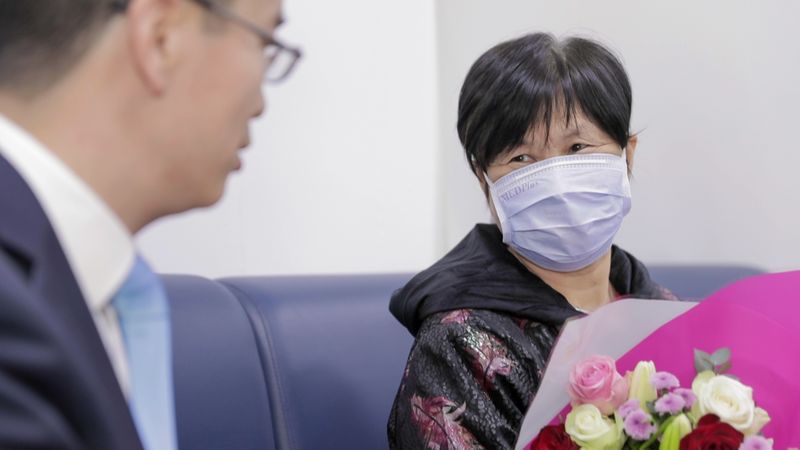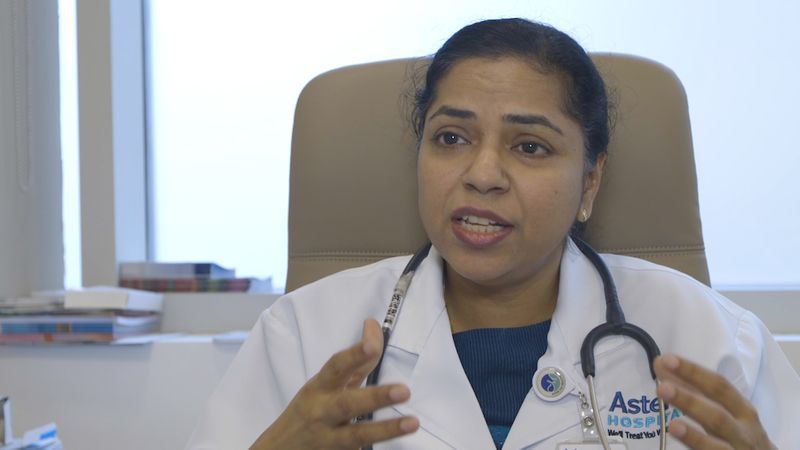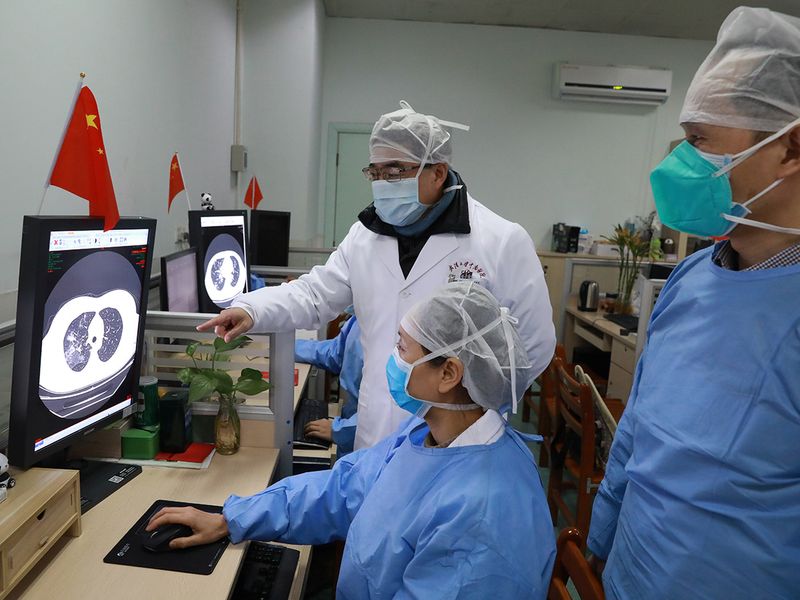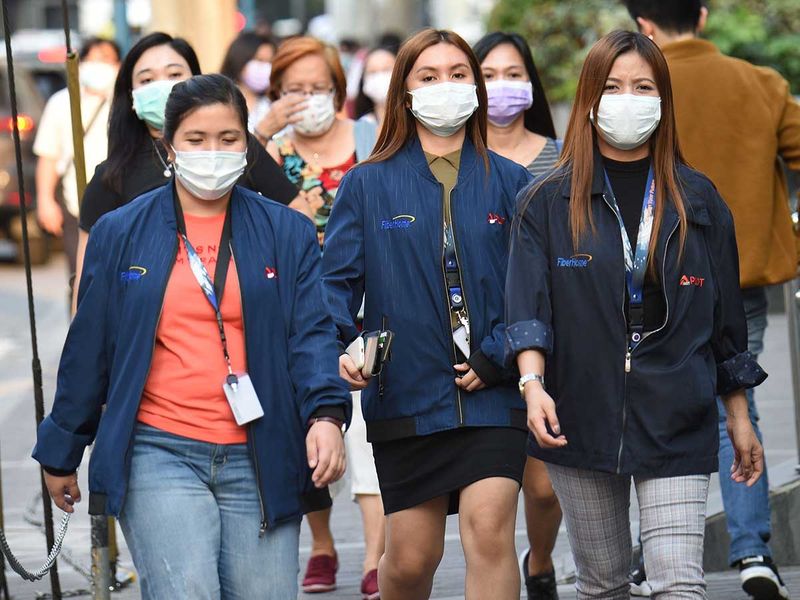Explainer:
Dubai: Liu Yujia, a 73-year-old Chinese woman, became the first person in the UAE to be cured of coronavirus, it was announced by the Ministry of Health and Prevention (MoHAP) on Sunday.
"The results of the 2019-nCoV detection test conducted on the patient turned out negative of the new coronavirus. She is now in a good health and fully recovered," Dr Hussain Al Rand, Assistant Undersecretary for Health Centres and Clinics under the Ministry of Health and Prevention.

"This case increases hope that other discovered cases in the UAE can also be fully recovered," added Dr Al Rand, who is also the Chairman of the National Committee for the Implementation of International Health Regulations and Prevention of Pandemics.
Specialist
Gulf News spoke to a specialist in internal medicine, Dr Smitha Muraletharan, from Aster Hospital in Al Ghusais, to find out how patients can be cured of coronavirus infection in general.
The simple answer: Through her own immune system.
“If you are healthy, you could just pass it off as a cough or cold,” Dr Muraletharan told Gulf News. “There’s no treatment or cure — just support to help your immune system clear it.”
With more than 40,000 cases and about 900 fatalities worldwide to date however, she explains that it needs containing to protect those of a weak immune system who have predispositions to falling sick easily.
If you are healthy you could just pass it off as a cough or cold. There’s no treatment or cure — just support to help your immune system clear it.
“The novel coronavirus is highly infectious — but not virulent,” she added.
“The proportion of deaths is low at about two per cent. But because there have been fatalities and because of that high rate of spread and infectivity, it does need to be quarantined.”

Are there specific treatments for different severities?
Only about one in four develop a severe form of the virus. The rest should theoretically be able to fight it off themselves.
“Mild infection patients can be quarantined in their own homes (otherwise hospitals would be flooded with cases and there would be more chance of transferring the illness) while those who show stronger infection can be stabilised in a hospital quarantine,” said Dr Muraletharan.
“Patients with mild to moderate infection when detected early and isolated can get their immune system strong enough to fight the virus,” she added.
“Patients with mild to moderate infection will have symptoms of upper respiratory infection such as cough, cold, runny nose and mild fever."
What should people do when they they start getting these symptoms?
When symptoms begin, patients must immediately report to hospital. At this stage, we isolate them, give them supportive medicine for fever and cold and keep them hydrated, said Dr Muraletharan.
“The virus inhabits the upper respiratory tract at this stage and it’s important to keep the body fluids high as virus can multiply in dryness. If in hospital, the patient can be hydrated intravenously.
Patients with mild to moderate infection will have symptoms of upper respiratory infection such as cough, cold, runny nose and mild fever.
“It is advisable no outside people meet the patient as his or her immunity is low and susceptible to contracting a secondary bacterial infection from visitors that can complicate the condition. In this case the patient would additionally require a course of antibiotics. For that reason doctors keep the room very sterile. The patient also has to wear mask as as to not infect another and observe strict hand hygiene.”
A diet rich in fresh fruits, well cooked vegetables, soups, electrolytes and a good dose of vitamin C to keep immunity strong, will also help the sufferer recover.

If it develops into pneumonia?
“Those kind of patients definitely require hospitalisation and one to one care with complete protection and isolation. Depending on the grade of pneumonia, they are treated with supplementary oxygen and antibiotics to prevent a secondary infection. If there is respiratory failure they will be given ventilator support, but this is in extreme cases and those numbers are less,” said Dr Muraletharan.
“People who are generally worse tend to be people with underlying illnesses and ailments that lower their immune system. Age is definitely not a plus point,” she added.
So on the whole, we shouldn’t be worried?
“Definitely not,” said Dr Muraletharan. “Apart from China other countries have contained the few isolated cases they have. The UAE has completely quarantined coronavirus. Panicking and rushing to the hospital will not help, it will only put pressure on the health service.
“Everybody has to maintain hand and respiratory hygiene, those mildly sick can maintain health with fluids, stay at home and take rest, hydrate well and some supportive medicines (to prevent secondary infection and to boost immunity) will be given.”
Is there a treatment for novel coronavirus?
Yes and No.
Yes, there are “supportive” treatments. These are aimed to reduce or relieve the symptoms.
No, because there’s no treatment specifically developed for novel coronavirus (2019-nCoV).
Is there a vaccine for coronavirus?
No. There is currently no vaccine to prevent 2019-nCoV infection. Scientists around the world are racing to find a treatment.
Do we have to wear a face mask?
“Those who have been diagnosed should wear a mask to avoid spreading the illness,” said Dr Muraletharan.

“They should maintain distance and frequent wash their hands and avoid touching their face. Coronavirus spreads via droplets. But the ordinary person on the street need not wear one. If they do it could work against its purpose.
"That filter could become loaded with pathogens that they then transfer to others by touching their face and passing germs onto others. Healthcare professionals are definitely at risk and maybe therefore it is advisable for them to wear masks at work more frequently, but ordinary people on the street need not do so.”
Steps to recovering from coronavirus
- Patient with mild to moderate infection who test positive for novel coronavirus must be isolated at home or hospital . It is advisable to keep contact with minimum people.
- Patient must wear mask at all times to avoid infecting anyone else and also practice strict hand hygiene protocol .
- Contact with external people must be avoided as there is fear of contracting secondary bacterial infections
- Stabilize the patient with supporting medicines for fever, cold , cough and doses of vitamin C
- Keep the patient well hydrated with fluids and maintain good electrolyte balance in body .
- A diet rich in fresh fruits and vegetables and well cooked food must be given to keep levels of nutrition high
- Complete rest must be taken for the immune system to fight back and recover from the infection .
- A quarantine of 14-16 days can help fight the virus and help such patients recover
Why do people infected by the novel coronavirus recover?
A Peking University specialist says that based on the small sample of people discharged from hospital after being infected, it shows people in serious and critical condition can be treated.
Dr Wang Guoqiang, an infectious disease expert at Peking University No 1 Hospital, said that preliminary data about people who had recovered after being infected was promising, according to report published by SCMP.
Based on a small sample of discharged patients from Wuhan, the city at epicentre of the nCoV outbreak, Wang said that about 6 per cent had recovered after being in a serious condition, while less than one per cent had recovered after being classed as in critical condition.
What is the mortality (death) rate for novel coronavirus?
Estimates widely vary — from a 21% CFR (case fatality rate) to 2.2%. There’s a huge debate among scientists specilising in the study of epidemics on how to property correctly calculate mortality during an outbreak.
Meanwhile, on its interim guidance for novel coronavirus published on February 5, CDC reported: “In 17% to 29% of those hospitalized, patients developed acute respiratory distress syndrome and in 10%, secondary infection developed. Between 23% and 32% of hospitalized patients required intensive care for respiratory support.
“Among hospitalized patients with pneumonia, the CDC stated that the case fatality rate (CFR) was as high as 11% to 15%. But that estimate includes only hospitalized patients and, therefore, is biased upward.”
Can HIV drugs really fight the novel coronavirus?
A handful of repurposed drugs, from drugs targeting Ebola to HIV, have shown promise, based on new findings.
However, Dr Smitha Muraletharan said: “Nothing has been demonstrated as yet. There are only rumours and theories and as for whether there will be a vaccine soon is difficult to tell, people are still working on it.”
Until recently, there were very few effective anti-virals. That was especially true for RNA viruses — like 2019-nCov and HIV — which use RNA, rather than DNA, as their genetic material. Successful development of HIV anti-virals show it might be feasible to do more.
The biggest hurdles: time and money. Developing brand-new drugs requires a huge investment of both time and resources.
While the medical community is waiting for the new miracle drug, it's worthwhile looking for existing drugs that could be repurposed to treat new viruses, even as the medical research community is feverishly looking to come up with and test a vaccine.
Dr. Anthony Fauci, Director of the US National Institute of Allergy and Infectious Diseases, one of the first scientists to recognise that the world was on the verge of a new epidemic, HIV/AIDS, explained that a coronavirus vaccine could be treated through a drug being developed based on messenger RNA (mRNA).

What is the best way to prevent infection?
The best way to prevent infection, according to the CDC, is to avoid being exposed to this virus.
However, everyday preventive actions help prevent the spread of respiratory illnesses:
- Minimize close contact with persons who have symptoms of respiratory illness, such as coughing or sneezing.
- Help ill persons contain droplets that result from their coughing and sneezing (see Respiratory Hygiene/Cough Etiquette).
- Wash your hands regularly.
- Avoid sharing personal items such as eating or drinking utensils, toothbrushes, and towels. You should especially avoid sharing these items with sick persons.
- Maintain a clean environment.
If I have symptoms of the novel coronavirus, do I need insurance to get treatment in the UAE?
No.
Coronavirus cases in UAE are treated free of cost, and insurance is not necessary. In all cases of novel coronavirus in the UAE, patients must be treated free of cost - regardless of whether they have insurance or not - health ...
According to a Dubai Health Authority (DHA) circular issued to hospitals — and based on directives from the Ministry of Health and Prevention (Mohap) — all DHA-licensed health facilities must consider suspected or confirmed cases of the 2019-nCoV as emergency cases.
"If the patient has insurance, the cases shall be treated as emergencies according to insurance regulation and insurance companies will honour any claims received," the circular states.
What should I do if I have symptoms of a respiratory infection?
Here’s the advice of health experts and the Dubai Health Authority (DHA):
- Do not travel while sick
- Stay home and avoid contact with others
- Seek medical care right away and tell them about your recent travel history








